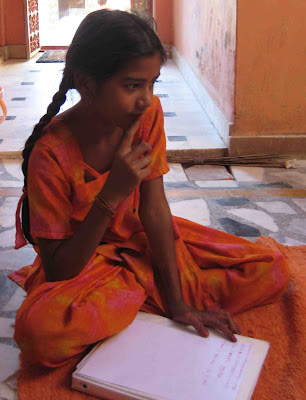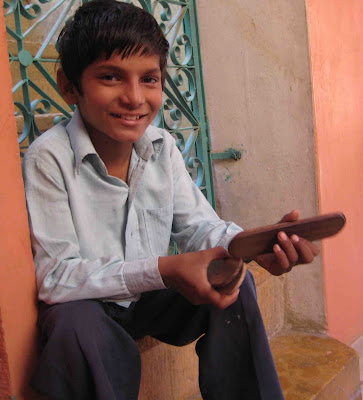At The Merasi School, the word ‘literacy’ has a richly honeycombed network of applications. There is the textbook definition: reading and writing capacities. When little Sumeer can write his name and read the word ‘India,’ he is becoming traditionally literate. But for the students who populate The Merasi School, tradition has led to cruel, sustained caste subjugation.

Neelu Khan practices the fundamentals of abc's
Merasi are considered ‘Untouchable,’ the lowest rung at the bottom of India’s hierarchical caste system. Consequently, they are shut off from basic human rights, born without birth certificates, denied access to adequate health care and political representation, and live on less than $1 a day. So we do not have blind reverence for the precedence of tradition. Rather, it is the untraditional and the uncommon that provide the architecture of literacy
for our classroom.
Our students are engaged in literacy of all shapes, sizes and colors. As children in Little Class, the entry level for boys and girls new to The Merasi School, learn the fundamentals of ABCs, they are also gaining core social literacy skills of patience, practice and sharing. The students in Middle Class and Big Class, the two more advanced sections, hunch over laptops, typing out basic words and phrases to develop crucial computer literacy. We are in the process of developing a Health Curriculum that will foster core health/nutrition/hygiene literacy. Then there is artistic literacy.
The Merasi (meaning musician/keeper of the stories) descend from a 37-generation old musical legacy that exists nowhere else in the world. With modernization blazing like wildfire across India, Merasi music is on the brink of extinction. The Merasi School, working in concert with Folk Arts Rajasthan, our parent non-profit, offers Merasi Music and Merasi Dance, two intensive classes that enable students to develop mastery over fundamental Merasi song rhythms and dance structures.

Sahju practices with khartals, a traditional Merasi instrument
Each dimension of literacy at The Merasi School nourishes and feeds the other pieces. And each ultimately builds towards the overarching objective: the literacy of justice. American educator Vartan Gregorian describes literacy as “access to knowledge, and thus, to power—the power of self-improvement and self-assertion, the power to achieve upward mobility, and the power over their ability to thrive and succeed.”
We believe that our students can and must develop the necessary academic, social and creative powers to redefine justice in a social landscape where the word has been stripped of integrity. For individuals to conceive of a truly inclusive, meaningful definition of justice, it is not enough to possess a few forms of literacy.
The Merasi School students must by holistically literate and able to engage relentlessly and compassionately with the deeply embedded challenges that
social change requires.

Niwab, Asif and Niwab stare into their horizons
Caitie Whelan is the India Editor for Wandering Educators.
